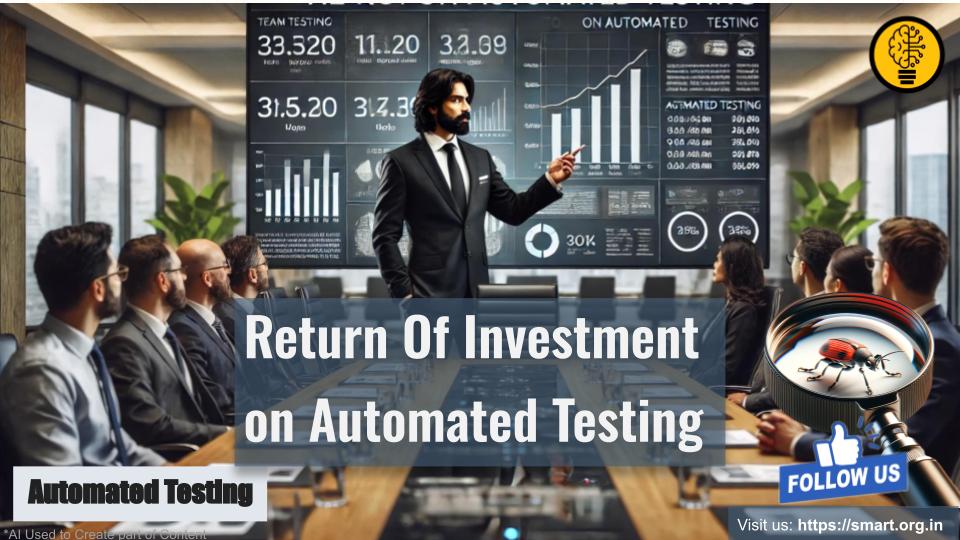In the boardroom, the language of return on investment (ROI) speaks volumes. For CTOs, CIOs, project managers, and entrepreneurs, decisions are often driven by financial impact. When it comes to software testing, the shift from manual to automated testing is an investment, but one with compelling returns. Let’s delve into how automation justifies its cost.
The Hidden Costs of Manual Testing
Manual testing, while essential, comes with inherent limitations:
- Time-Consuming: Each test case requires dedicated human effort, often leading to bottlenecks and delays in the development lifecycle.
- Error-Prone: Even the most diligent testers can make mistakes, especially when faced with repetitive tasks.
- Limited Scalability: As software grows, so does the complexity of testing. Manual teams struggle to keep up with the expanding scope.
- Opportunity Cost: The time spent on manual testing could be better allocated to strategic tasks like innovation and feature development.
The Financial Benefits of Automation
Automated testing directly addresses these issues and yields substantial financial benefits:
- Faster Time-to-Market: Automated tests execute rapidly, accelerating the testing phase and enabling quicker releases. This translates to a competitive edge and revenue generation.
- Reduced Defect Costs: By identifying and fixing bugs early in the development cycle, automation minimizes the expensive rework and support costs associated with post-release defects.
- Optimised Resource Allocation: Automating repetitive tests frees up your skilled QA personnel to focus on exploratory testing, ensuring a more comprehensive assessment of your software’s quality.
- Improved Test Coverage: Automation tackles a wider array of test scenarios, including those that are time-prohibitive for manual testing. This leads to a higher-quality product with fewer surprises down the line.
- Cost Savings Over Time: While the initial investment in tools and infrastructure is real, the long-term savings from reduced manual effort and defect remediation significantly outweigh the costs.
Quantifying the ROI
Calculating the ROI of automated testing involves assessing:
- Investment Costs: Tool licenses, infrastructure, script development, and training.
- Savings: Reduced labor costs, shortened testing cycles, and decreased defect-related expenses.
The ROI formula is simple:
(Savings – Investment Costs) / Investment Costs * 100 = ROI (%)
By meticulously tracking these metrics, you’ll gain a clear picture of the tangible value automation brings to your organization.
Smart Group India: Your Automation Partner
At Smart Group India, we recognise the financial implications of testing decisions. Our expertise in both manual and automated testing empowers startups and tech companies to make informed choices. We can help you assess your testing needs, develop an automation strategy, and implement the right tools to achieve the optimal ROI.
A Strategic Investment
Automated testing isn’t just about efficiency; it’s a strategic investment that bolsters your bottom line. By embracing automation, you’re not only improving software quality but also gaining a competitive advantage in the marketplace.
Ready to Explore the Possibilities?
Contact Smart Group India today to discuss how we can help you harness the power of automated testing and achieve a substantial return on your investment.


In conclusion, we at Smart Group hope this article has provided you with valuable insights and actionable strategies. Smart Group India Incubation provides a nurturing environment for startups, offering comprehensive support and resources to foster growth and innovation. With access to expert mentorship, state-of-the-art infrastructure, and networking opportunities, startups can thrive in their journey from ideation to market launch. Explore our services in DevOps consultancy, IoT solutions, and cybersecurity to leverage cutting-edge technology for your business success. Join us to embark on a transformative journey towards entrepreneurial excellence. For further information and a deeper dive into this topic, we encourage you to explore the following resources. These links offer a wealth of knowledge and expert opinions that can enhance your understanding and assist you in applying these concepts effectively.
Startup Policies Govt. Of India
Startup News Sites
Publications
Research Papers